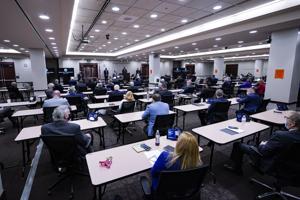Indiana looks to stop employers from forcing workers to get vaccines

(The Center Square) – Overflow crowds of concerned citizens filled the hallways of Indiana’s Capitol on Wednesday as the legislature held a hearing on a bill that would stop employers from making people get a vaccine as a condition of employment.
The bill, introduced by Sen. Dennis Kruse, R-Auburn, adds a freedom-of-conscience provision to Indiana law, affirming the right of citizens to opt out of vaccines for pretty much any reason.
It reads: “An employer may not: 1. require, as a condition of employment, that an employee or prospective employee receive any immunization; or 2. discriminate against an employee with respect to: a.) an employee’s tenure, compensation, and benefits; or b.) terms, conditions, and privileges of employment; for failing to receive any immunization; if the immunization is medically contraindicated for the employee or prospective employee, or if receiving the immunization is against the employee’s or prospective employee’s religious beliefs or conscience.”
The bill also includes a provision allowing people who’ve been denied employment due to refusal to get a vaccine to sue an employer or prospective employer for actual damages, punitive damages and court costs/attorneys fees.
About 65 people came to the Capitol to testify for or against the bill, the great majority of them testifying for it.
A nurse employed by IU Health told senators she had to transfer into a non-medical job with her employer as they refused to accommodate her when she claimed an exemption under existing law.
“I said I have a religious exemption,” she said. “I always had this, everywhere I worked. They said no. They denied it, turned me down.”
Another woman testifying in favor of the bill said she knows many people who have been injured by vaccines and says she believes people have a right to “bodily autonomy and bodily integrity.”
“No employer should be able to mandate a medical procedure as a contingency of employment,” she said. “No one should have to choose between being able to work, make money to support their families and risk taking a vaccine that is largely untested.”
Under federal law, Americans cannot be denied employment if they cite religious reasons for objecting to a vaccine requirement, but most people are unaware of this, and would not have the means to fight an employer who did not honor a religious exemption.
The Kruse bill, Senate Bill 74, was introduced at the urging of an organization called Hoosiers for Medical Liberty, based in Columbia City, in northeast Indiana.
The hearing was before the Senate Committee on Pensions and Labor.
Senators compared it to a bill that passed the Indiana General Assembly last year that forbade employers from making employees get a microchip implanted into their bodies as a condition of employment.
“The question is whether employers have the right to mandate anything like that, dealing with bodily autonomy,” one senator said.
The idea of having to get vaccines as a condition of employment is not new for health-care workers or members of the military, but is new to most people, and would have been almost inconceivable before last year.
In August, all employees of Indiana University, including faculty, received an e-mail saying they needed to get the flu vaccine and sign a document agreeing to following CDC guidelines related to COVID-19 — important in the near future, those guidelines could include a recommendation everyone get the COVID-19 vaccine.
IU’s spokesman, Chuck Carney, says the university allowed medical and religious exemptions for the flu vaccine requirement, as federal law requires, but one IU employee says he was told by the university’s Office of the General Counsel that there were no exceptions to the document requiring all CDC guidance on COVID-19 be followed, and that no wording would be changed for any “dissenters.” When he tried to claim a religious exemption to the flu vaccine, he said he was continually put off, and left hanging, unsure if he would be fired for his refusal to get it.
The medical community in Indiana is opposed to the Kruse bill, as are some members of the business community.
A representative of the Indiana Chamber of Commerce testified in opposition to the bill on Wednesday, complaining that the bill creates punitive damages. “We have a duty under OSHA to provide a safe environment and we do that how we see fit,” he said.
Kruse told The Center Square that going into the hearing, the bill had the support of the majority of members of the committee, and that he believes it still does.
The committee will revisit the bill next week and vote on several amendments, most of which are intended to weaken some of its provisions. One of those amendments is expected to limit the exemption so it only applies to the COVID-19 vaccine, and not to any other vaccines.
Disclaimer: This content is distributed by The Center Square

